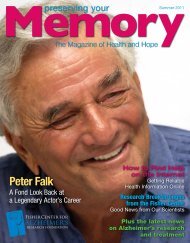Tracie Thoms - Fisher Center for Alzheimer's Research Foundation
Tracie Thoms - Fisher Center for Alzheimer's Research Foundation
Tracie Thoms - Fisher Center for Alzheimer's Research Foundation
Create successful ePaper yourself
Turn your PDF publications into a flip-book with our unique Google optimized e-Paper software.
professor of recreation, leisure services<br />
and wellness at Ferris State University,<br />
says eco-psychology blends<br />
environmental philosophy, ecology<br />
and psychology into a discipline that<br />
studies how the health of the planet<br />
impacts human health. “It is believed<br />
that the mind can be com<strong>for</strong>ted and<br />
healed through time in natural environments,”<br />
she writes.<br />
<strong>Research</strong> appears to support this<br />
theory. A 2003 study in the journal<br />
Psychology of Sport and Exercise found<br />
that running in a park resulted in a<br />
greater reduction in anxiety and depression<br />
than running through an urban<br />
area. And a 2008 study in Psychological<br />
Science shows the cognitive benefits of<br />
interacting with the great outdoors.<br />
Frances E. Kuo, Ph.D., a faculty<br />
member at the University of Illinois<br />
at Urbana-Champaign who researches<br />
the effects of nature on human functioning,<br />
says, “We think that spending<br />
time in nature helps rest a part<br />
of the brain that’s involved in mental<br />
ef<strong>for</strong>t, giving it a chance to recuperate<br />
and be ready to tackle ef<strong>for</strong>tful tasks<br />
afterward.”<br />
Also, exposure to the outdoors also<br />
seems to affect the nervous system and<br />
the brain actions responsible <strong>for</strong> our<br />
changing moods, Kuo adds. Part of this<br />
effect appears to come from the switch<br />
between artificial and natural light.<br />
Vindum says, “Studies have been<br />
done on mood, where somebody goes<br />
from a naturally lit environment to an<br />
artificially lit environment and their<br />
mood changes toward the negative.”<br />
Binding a Community<br />
Of course, nature offers societal benefits<br />
as well. Green spaces and parks<br />
become gathering places <strong>for</strong> communities,<br />
where people get to know one<br />
another and learn to look out <strong>for</strong> each<br />
other. Add the fact that greenery helps<br />
humans relax and renew, and it’s not<br />
hard to see why a 2001 study by Kuo<br />
and her colleagues showed that crime<br />
decreases in urban areas with green<br />
spaces.<br />
On a more personal level, taking a<br />
walk around the block can enhance<br />
your social life. “We need the ability<br />
to interact with others, and it’s key<br />
to have that social time every day,”<br />
Vindum says. “When I go <strong>for</strong> a walk<br />
around my neighborhood, just a smile<br />
<strong>for</strong> a neighbor goes a long way. Just<br />
knowing and being familiar with our<br />
surroundings helps us feel like part of<br />
a community.”<br />
Another thing Vindum has noticed<br />
is exercise becoming more of a social<br />
event. “People are not meeting up <strong>for</strong><br />
food and drinks so much anymore. It’s<br />
‘Let’s meet at the trailhead or let’s meet<br />
at the park,’ and that’s great quality<br />
time spent together interacting.”<br />
Connecting with Spirit<br />
Finally, taking a walk in the park can<br />
help you feel connected to the world as<br />
a whole and feel part of something bigger<br />
than your community.<br />
Many scientists believe that humans<br />
have a biological need to connect<br />
with nature. In 1984, Pulitzer Prizewinning<br />
scientist E.O. Wilson published<br />
Biophilia, an exploration of the<br />
basis of this attraction to the outdoors.<br />
In her paper, Mitten says that Wilson’s<br />
theory means that “people’s success in<br />
their search <strong>for</strong> a coherent and fulfilling<br />
existence depends on their relationship<br />
to nature.”<br />
Vindum adds, “<strong>Research</strong> suggests<br />
that we have an affinity <strong>for</strong> nature<br />
that’s hardwired into us. We need it, we<br />
want it, if we don’t have it we become<br />
unwell.”<br />
So the next time you put on your<br />
walking shoes, just walk on past the<br />
treadmill. Don’t get in your car. Just<br />
head out the door to the nature trail.<br />
Or to the beach. Or down by the river.<br />
Improving your health is as easy as a<br />
walk in the park. ■<br />
Getting Started<br />
Vindum offers these tips <strong>for</strong><br />
taking a walk outside:<br />
• Go <strong>for</strong> 10 minutes.<br />
• Just walk. You don’t need to<br />
have a plan.<br />
• Take it easy on yourself.<br />
When you’re ready to bump up<br />
your outdoor stroll, try these<br />
suggestions:<br />
• Look <strong>for</strong> green spaces on<br />
maps and walk there.<br />
• Learn the trees, flowers, and<br />
birds on your trail.<br />
• Smell the pine boughs or<br />
eucalyptus leaves.<br />
• Incorporate textures. Walk on<br />
cobblestones. Take off your<br />
shoes <strong>for</strong> a stroll in the grass.<br />
A walk outdoors provides<br />
mental health benefits, as well.<br />
summer 2010 www.ALZinfo.org 29






